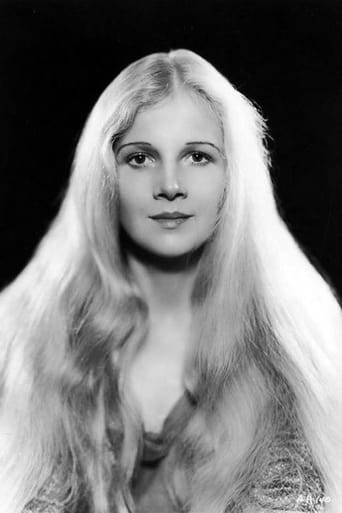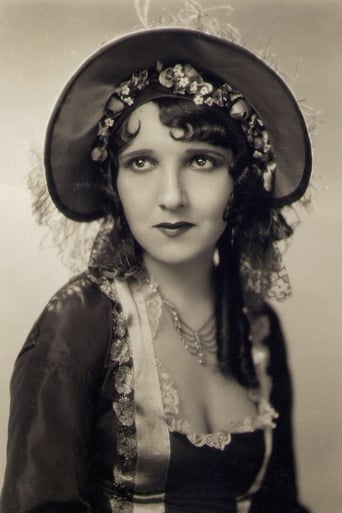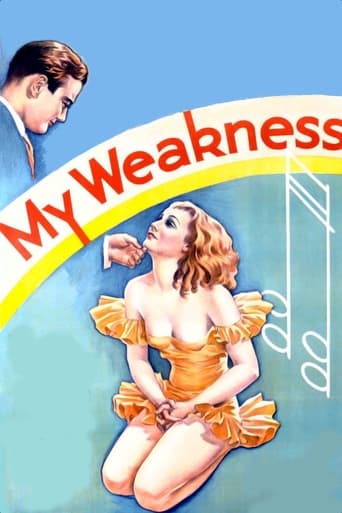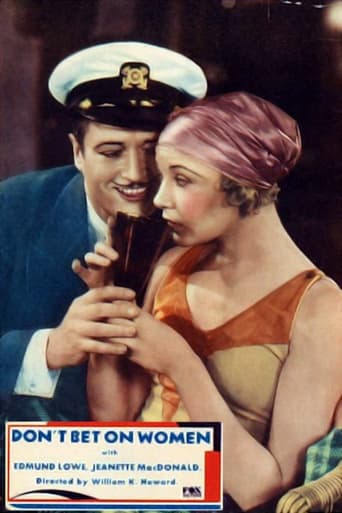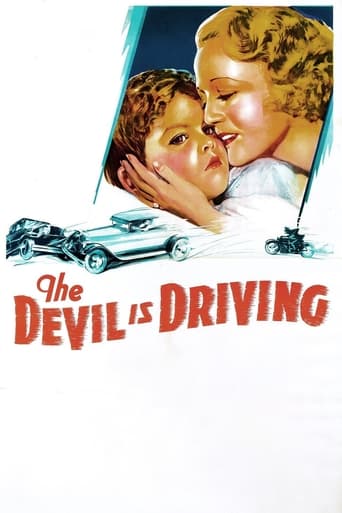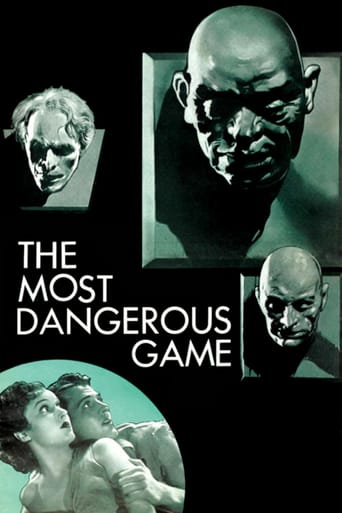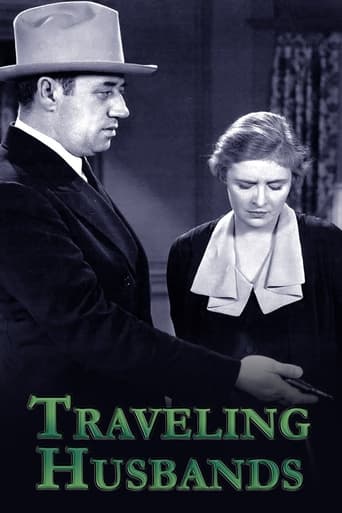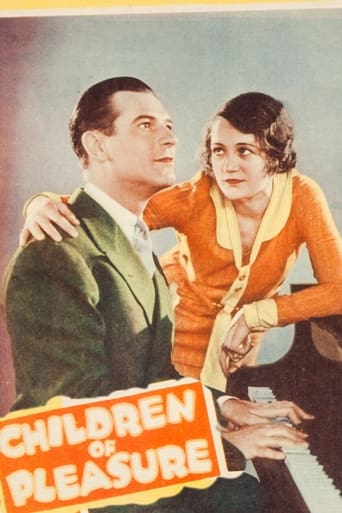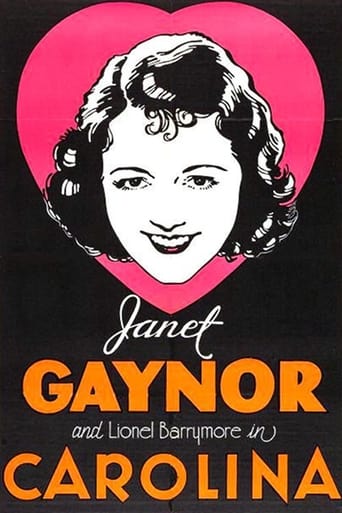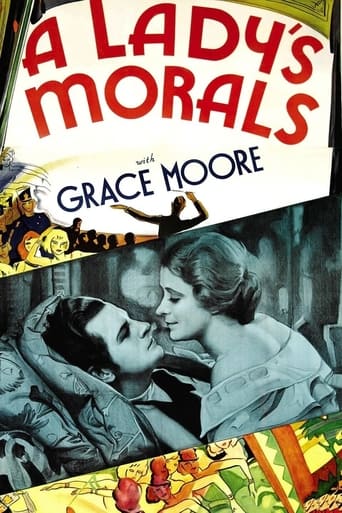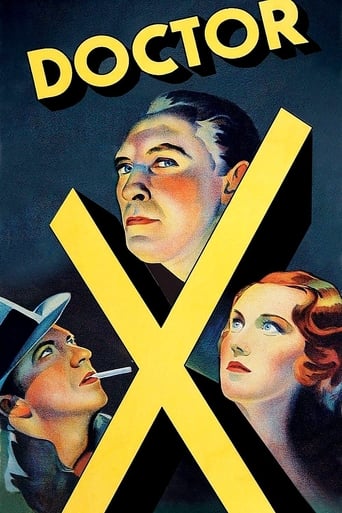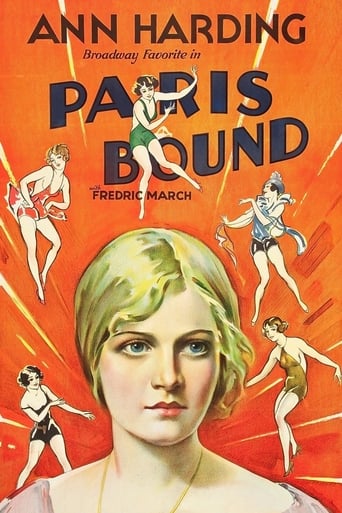
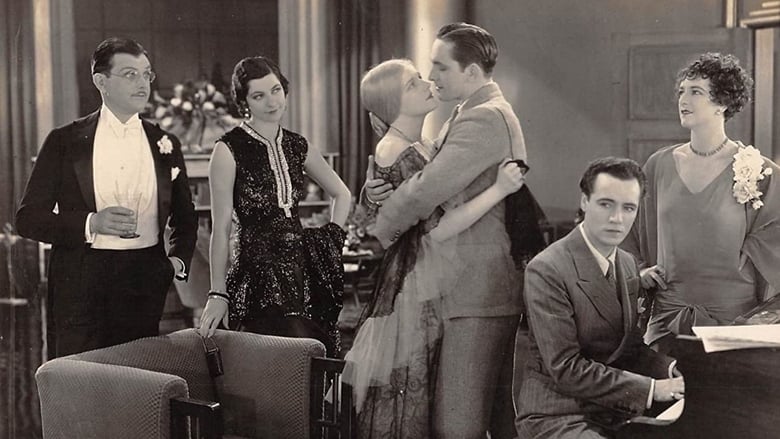
Paris Bound (1929)
Jim Hutton and Mary Archer are two liberals who are content to remain faithful to each other in spirit only. They are married with all the ritual of a church wedding, the bride believing that each should be allowed perfect freedom in personal contacts. Complications arise when these ideals are put into practice.
Watch Trailer
Cast


Similar titles
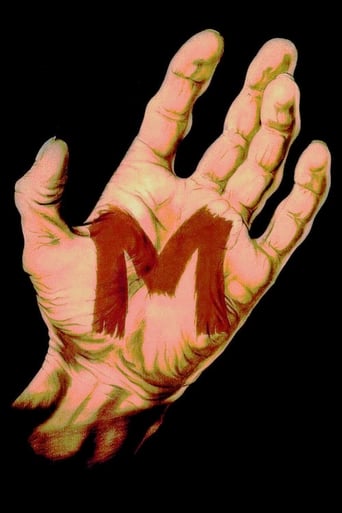
Reviews
The rediscovered Paris Bound is, as other reviewers have pointed out, something of a disappointment. It might be considered the quintessential talkie in that the characters talk and talk and talk and talk and, frankly, not to much purpose. Philip Barry had a certain reputation as playwright and Paris Bound had a certain success on the stage because it treated a subject that was still regarded as extremely risqué in the US but it is an absolutely dire piece of work. Passages quoted in other reviews give a good idea how "precious" and artificial the dialogue is and comments in other reviews also reveal how ambiguous the treatment is. The fault again lies largely in US society which required such controversial subjects to be couched in fatuous double-talk and to be presented in a totally misleading fashion.So the controversial nature of the play/film is all a matter of trompe l'oeil. The "liberal" couple are not very liberal at all (even at the outset) but quite extraordinarily uxorious, so that, in a play/film supposedly about adultery, we have in fact an abundance of passionate husband-wife kissing and precious little adultery (talk figures strongly there too) and the conclusion is of course deeply conservative. Adultery, it would seem, is just an illusion; blink twice and it just goes away. The husband's divorced parents (arguably the genuine liberals) are treated rather as aberrant monsters.Barry shows essentially the same ambiguity in The Philadelphia Story which similarly toys with ideas of divorce and adultery, to end with a predictably conservative conclusion. Divorce, like adultery, is also apparently an illusion. Laugh twice and that goes away too. The Philadelphia Story is also extremely talkative but has the distinct advantage of being funny which Paris Bound is most certainly not.Virtually the only "American" film-makers who manged to break through this "no sex please, this is the USA" barrier, were Erich von Stroheim and Ernest Lubitsch. Stroheim capitalised on his established wartime reputation as a "German villain" to get away with things(possible because they were heavily marked "villain") which no other director in the US could get away with. Lubitsch, after long years of producing light comedy and musicals to establish a huge if slightly bogus reputation, and by dint of a good deal of skillful mise en scène and a certain low cunning,was able to produce a remarkable film like Design for Living and make light of adultery in A Certain Feeling or To Be or Not To Be. But these remained the exceptions that proved the rule.The Stroheim logic was peculiar to his own situation and rather ingenious. When a character has been shown, with official approval, raping a nurse and defenestrating a baby in a propaganda film, it is a bit difficult to find grounds on which to then censor the deviant behaviour of a succession of rather similar characters played by the selfsame actor in his fiction films (Blind Husbands or Foolish Wives or Blind Husbands)But even so Stroheim had to fight hard to maintain his independence and had plenty of problems with censorship, particularly on the part of the snip-happy producers who would eventually succeed in destroying his directing career completely. He was after all at the time only the best director that the US had ever produced (by quite a margin). Who needs such people? Gloria Swanson was probably right in thinking that even Stroheim would not have got away with Queen Kelly as originally filmed - the later scenes, cut from the version eventually shown, are still quite troubling to watch even today. She is wrong in blaming (as she later did) the Hays Code, which did not then exist but, contrary to popular belief, there was plenty of pre-code censorship and the Hays Code merely "codified" rules that very largely already existed.The difference between "pre-code" and "post-code" is for the most part just wishful thinking. Most censorship, before and afterwards, was in any case, as with Queen Kelly, self-censorship by the producers, constantly terrified of any kind of controversy, which, in those days, still had the power to ruin careers and conceivably even institutions. The Hays Code (in any case their own creation) simply gave producers a convenient alibi. So it is not really the case that the Code prevented directors from doing this, that or the other (particularly the other) but rather that it gave carte blanche to the producers and their henchmen (the so-called "editors", but sometimes more accurately described, even in credits, as "cutters") to chop the films about so as to render them "harmless" in the way they were so fond of doing.The "Lubitsch touch" was, in the end, a more sustainable method of getting round the rules than "the man you love to hate" method, especially as it was a myth originally created by the production companies themselves. Lubitsch simply broadened the definition. To return to this film, Fredric March is adequate (the least talkative character, he doesn't really have much to do but kiss) and Ann Harding is, as ever, dazzling, but her two other films made in the year, Her Private Affair - attacked, ironically, by reviewers at that address as being based on a "failed" play - and Condemned are both better films than Paris Bound although this was the film that made Harding a star because of the rather spurious reputation achieved by the play.
Thanks to the efforts of Gary Lacher who found and repaired a 16mm print, this is no longer a lost film. Alas, it's no lost masterpiece either. In fact, as we might expect from an early talkie, it's all talk, talk, talk and little, little action. But Ann Harding gives a competent performance and the other players, with one exception, are also up to scratch. The exception, oddly enough, is Fredric March, here making his eighth movie appearance, and his third sound film. His is a vital character, but March seems to be playing the role as if he were just discovering movies for the first time in his career. His performance is hesitant, to say the least. Admittedly, director Edward H. Griffith is of no help. He certainly gives Ann Harding the best camera angles, but March doesn't fight back. He seems both intimidated and so overawed that he's content to stay in the shadows, as it were. Just look at the posters reproduced on the Grapevine DVD. At first sight, the cover reproduction of the original 1929 poster does not feature March at all. Ann Harding takes up at least half the poster and her name is right up there in big, big letters. But with the aid of a magnifying glass, you can just make out the name of Fredric March, buried under the leg of some sexy chorus cutie!
"Paris Bound" is clearly a Pre-code film with its strange moral sensibilities and it probably will shock most viewers today. However, I also found that the film's message was bizarre and confusing to say the least.When the film begins, Jim (Frederic March and Mary (Ann Harding in her first film) are getting married. On the day of the wedding, Mary has a strange talk with Jim--almost like she is suggesting an open marriage where each can sleep with whomever they like. Later, it seems more like she really, perhaps, intended to say they both could have their own lives and friends of the opposite sex...which is, practically speaking, an invitation to have an open marriage. Well, Jim is the nice and dutiful husband...for a few years. Unfortunately, Nora is a real 'modern girl' and offers to become his mistress.In the meantime, you see some weird interludes with Jim's parents. They are divorced and the father blames it all on his wife! He admits to having had affairs but that, to him, seems hardly a reason to end the marriage as these ladies meant nothing to him(??). So, SHE is painted as the unreasonable person. Later, this man advises Mary to take his attitude...and when Mary learns that Jim might have a mistress, she ponders sleeping with her best friend, a man she often hangs out with when Jim is off on business trips.Does all this sound odd and confusing? Well, wait until you see the ending...and then you'll most likely wonder what the film was all about and what messages it was trying to convey. I know that it's NOT a great film if you want to give newlyweds some healthy marital advice!So is it any good? Well, I think Harding sometime overacted. March was fine even if his character seemed detestable. Overall, however, the film came off as a bit stagy and unsatisfying. It's also the sort of amoral film that the studios would abandon once the new Production Code was put into effect in mid-1934.
Slow and stilted, this film is obviously the adaptation of a play--all the action takes place (or could) in one room. The director shows his tin ear (and whatever is the visual equivalent) by starting the movie with Ann Harding and Fredric March going through the wedding service, which goes on and on and on. The two attractive leads, both highly accomplished actors, are the reason for seeing this, as are such distinctly period touches as his saying to her "Take a deep breath" and handing her a cigarette. Ilka Chase also makes two brief, welcome appearances as a fashionable, flippant socialite. But the plot is minuscule and is also well past its use-by date--we're told that a good wife overlooks a husband's affairs if he really loves her and the other women mean nothing to him. And how does she know he feels that way? Because he says so!


